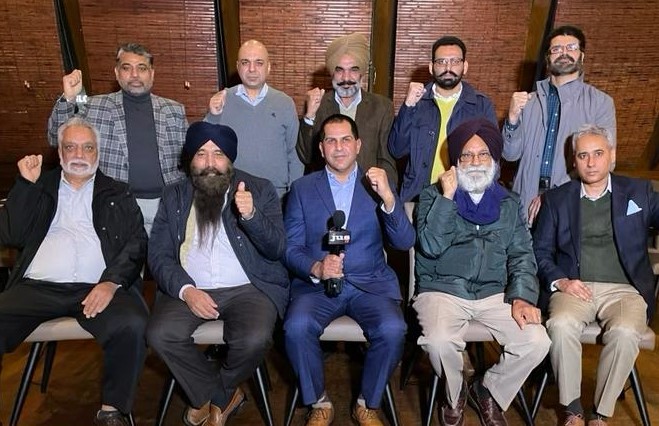Malwa Brothers
Community Organization
The Malwa Brothers Organization USA at a meeting in Queens, NY pledged support for the farmers’ peaceful and disciplined agitation against the 3 farm bills. But Karamjit Singh Dhaliwal, president of the organization, condemned the January 26 violence in Delhi and the hoisting of saffron flag at Red Fort, which has brought a bad name to the farmers’ struggle. Pointing out that the actor Deep Sidhu named in the incident is not the son of a farmer but a lawyer, Dhaliwal asserted, “Indian flag comes first for us.” He also condemned the self-serving Khalistani groups in America.

Vimal K. Goyal
Business Owner
The Parliament of India passed three farmers bills recently:
- The Farmers Produce Trade and Commerce (Promotion and Facilitation) Bill passed in 2020. It allows farmers to sell their harvest outside notified APMC mandis without taxes.
- The Farmers (Empowerment and Protection) Agreement on Price Assurance and Farm Services Bill. It facilitates contract farming and direct marketing.
- The Essential Commodities (Amendment) Bill deregulates the production, storage, movement and sale of cereals, pulses, edible oils and onions.
The existing farmers’ acts in India are over 200 years old from the British era when farm produce was exported to England through the East India Company. The laws were in favor of the British Government so that they could purchase the produce at cheaper prices and export. These laws were obsolete in modern India. Non-agricultural sector has grown exponentially while the farm industry has been left behind. Several amendments were introduced by various administrations, but fell short of reforming the agricultural sector.
There is an imbalance – while wheat and rice are in greater supply, edible oil seeds, pulses, fruits and vegetables are in greater demand. Large surplus of sugar and grain are difficult to dispose of in the international market due to poor prices. Milk, fishery and horticulture show high growth with no government intervention while growth rate in cereal is extremely low even with intervention and Minimum Support Price. It shows that free market forces are at work and will benefit the agricultural sector.
Most of the farmers have less than one acre land, making it difficult for them to survive and support the family. Shortage of storage facilities causes glut and price crash at some places while shortages and high prices are seen at other locations. Industry needs partnership between producers (farmers ) and processors (factories) so that farm products of different quality and quantity can be made available to the factories nearby. Most of the produce output in one state is consumed outside of that state. New investments go to the non-agricultural sector and investment in the agricultural sector is less than 1% of total new investment. In addition, farmers are disillusioned with the current Minimum Support Price which is much like a subsidy or welfare to support farm industry. So, farmers need better options to sell their products in the open market to get better and competitive prices.
Mandis had several problems, such as Middlemen and Brokers’ charges/commissions are fixed but not capped, no direct sale by farmers to factories or traders, all traders / buyers needed to have license to operate in mandi (revenue to states), multiples taxes on sale/purchase transactions etc. The new act will allow farmers to sell produce outside of Mandis and they will become price dictators. MSP will remain as part of the new act. Also, a farmer can leave contract farming without any hassle. The act makes confiscation of land illegal. Yet, states have been allowed to make rules to help farmers in using other legal options. These acts empower the farmers in guaranteed price and input and technical services under mutually acceptable agreement between farmer and sponsor. In conclusion, the new farm acts were passed to give a new boost to the farm industry and transformation of the rural economy.

Balaji Nagaraj
IT professional
It is not surprising that most people in India and abroad feel that the farmers’ protest was never in the interests of farmers. Witness changing demands after each round of talks, being adamant on the repeal, rejecting the SC appointed committee, rejecting the government’s offer to suspend the laws for 1.5 years until a solution is found and finally the Red Fort incident.
Let me explain the fiscal impact. Just the cost of procuring all 23 listed crops at MSP would be about Rs.23 lakh crore, which is 50% of India’s total national annual expenditure. Can any nation offer to spend more than half its budget on offering subsidies to the 10% farmers alone? The current protests are by farmers of two states who corner more than 70% of the MSP purchases.
Farmers are our strength, but that doesn’t mean weakening other sectors. Running a nation is not a simple task.
As we all know, the Indian Government has been acting responsibly so far in negotiations considering options other than full repeal. So, the protesting farmer leaders need to properly guide the farmers, use reason for the best solution and not let anti-national elements and opposition exploit the situation for their agenda.

Nilima Madan
Community activist
On Jan 26, Samyukt Kisan Morcha led protesting farmers clashed with police, rocking Delhi. A man climbed the flagstaff at the Red Fort where the tricolor is hoisted and held up a Nishan Sahib flag.
After 3 farm sector bills were passed to replace the existing acts, Akali leader Harsimrat Kaur Badal resigned from the Modi cabinet in protest, alleging they will destroy the agriculture sector in Punjab, But no one imagined what was to follow.
The 3 bills are for farmers and traders to have barrier-free, inter-state and intra-state trade of produce outside mandis by reducing logistics cost, saving loss of produce due to poor storage or loss of revenue to middle men, allowing the furthest farmer equal opportunity through contracts and by securing a better price with a modernized supply chain and better inputs. But the primary fear remained, of change and dismantling of a proven free market system for decades that had been running both in a formal and informal way and opening avenues for capitalist hoarders of commodities to sell at an uncapped price – not to mention export bans or removal of cereals, pulses, oilseeds, onion and potatoes from the list of essential commodities. Most economists and experts agree that Indian agriculture needed reform, but many fear losing the trust of farmers by passing these laws.
Will this agitation unnerve the government enough to reverse the laws or will it result in a lost cause and identified miscreants to face action? But what we have seen develop as a divide will become a part of history. Whether India progresses towards a free-market economy or reverts to old ways, some reforms will stay.

Narinder Kapoor
Interfaith leader
Prime Minister Narendra Modi has hailed the farm acts as a landmark reform that will remove middlemen and allow farmers to sell directly to large institutional buyers and retailers. Critics argue that farmers will not have the negotiating power to do so.
The first green revolution catapulted the farmers from Punjab, Haryana and parts of UP into another league. It is time for another revolution to help farmers from other states. The follies of the first revolution such over-reliance on pesticides or excessive use of ground water should not be repeated.
In the face of the protests, the government needs to either withdraw or keep the new Farm Bills in abeyance. It will be prudent to remember that Indian agriculture is not limited to Punjab and Haryana. Other states also need to be factored in any move to better the lot of farmers.
The government of India gave full freedom to the farmers to exercise their fundamental right of free speech. But what happened on January 26 is despicable and disgraceful. Organizers of the protest cannot escape responsibility. Those responsible for instigating and commissioning the anti-national sacrilege by hoisting Sikh religious flag on the Red Fort must be brought to justice. They have inflicted heavy emotional pain to the Sikh religion.












